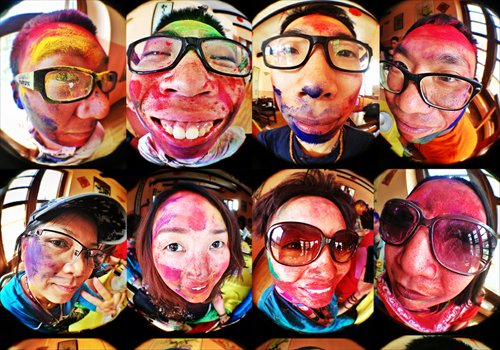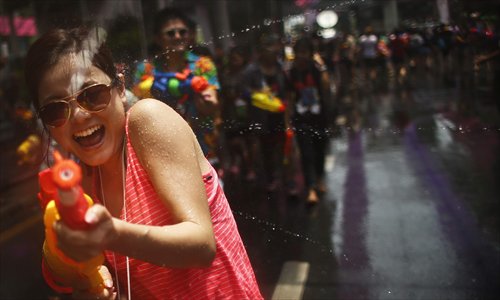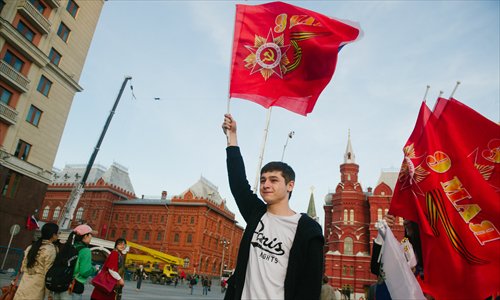Festive moods
Local festivals breathe life into travel for those tired of same old tourist traps
The first thing Li Yirui did after quitting her job as a journalist in Chengdu, Sichuan Province to become a freelance photographer was to go to Nepal for Holi, an ancient Hindu religious festival in which participants batter each other with colored powder and water.
Also known as the festival of colors or the festival of love, Holi is traditionally celebrated on the full moon of the 12th month of the Hindu calendar, typically February or March on the Gregorian calendar.
Li recalls heading with her friends toward Durbar Square in Katmandu on the crack of dawn on the day of Holi in 2014, flushed with anticipation. Along with India, Holi is most prominently celebrated in Nepal.
At first, Li said they did not notice anything out of the ordinary on the streets, but as they got closer to the square, they were met by a sea of young Nepalese, faces painted, shouting "Holi! Holi!"
"We couldn't help but feel excited. We were full of curiosity and eager anticipation for the carnival!" said Li. "The spirit during festivals is the best representation of a country or city's character."
According to National Tourism Administration, more than 98 million people from the Chinese mainland traveled abroad in 2013. As Chinese tourists become more discerning, traveling to local festivals is becoming an increasingly attractive option for those looking for a more authentic experience of cultures abroad.
A feast of colors
Even now, when she closes her eyes, Li said, she can picture the bombardments of colored powder flying through the sky and the smiling faces of triumphant locals and curious tourists alike. "It was a party of colors. Every participant was extravagantly dressed, which makes you reflect upon [Nepal's] creativity and imagination."
Besides fighting with colored powder and colored water, said Li, there was also live music with DJs and other performances, including break-dancing battles.
"Chasing after festivals is a great way of traveling," said Li. "Participating in festivals makes it easier to blend into the local life, and it's the best way to experience another culture's beliefs and lifestyle."
For those eager to take part in Holi, Li said it was advisable to double-check the date well in advance, as it varied year to year.
"Wear a white T-shirt, because all the colored powder [being thrown around] will paint your clothes, which will give you a unique souvenir," she said.
For those intending to carry cameras, water-proof and dust-proof cases were a must, she added.

Chinese tourists smeared with colored powder after participating in Holi, a Hindu religious festival, in Nepal. Photo: Courtesy of Li Yirui
Celebrating Victory Day
Susan Xu, 30, recently returned to Beijing after a one-month trip in Russia. One of the highlights of the trip, she said, was witnessing the celebrations commemorating the 70th anniversary of the end of World War II. "Everybody showed great respect to the veterans. Children offered them flowers."
Xu, who studied in Moscow for a year from 2009 to 2010, said that in her experience, Russians really embraced national holidays.
"Usually during Russian holidays, there are music concerts held at public squares. Anyone can participate and dance in circles," she said. "They tend to have more outdoor activities, unlike us Chinese, who usually celebrate every [festive] occasion through feasting."
Xu said that Chinese people often perceived Russians as strong and battle-hardened, and visiting during national holidays and festivals was a good time to see those particular traits in action. "Especially when it comes to drinking," she said, laughing.
Russia's religious holidays were also ideal occasions for understanding the country's culture and spirit, said Xu. For travelers who wanted to have an authentic experience of Russia's festive life, Xu suggested going on the Victory Day celebrations, New Year's Day or Maslenitsa, a religious and folk holiday.

Songkran, or Thai New Year, attracts tourists from around the world to revel in its large scale water fights. Photo: IC
Water fight!
Wang Yuntao, 30, was in Bangkok and Koh Samui in Thailand last April for Songkran, also known as Thai New Year. To his surprise, he found himself in a water fight, a local custom rooted in the tradition of people sprinkling water on each other as a form of blessing.
"It was a memory that I'll cherish for life," said Wang, who is from Tianjin. "People of different nationalities who didn't know each other were having a good time, like a group of old friends."
The next morning, on their way to the local Buddhist temple, Wang and his wife found themselves drenched again while being carried on motorcycles to their destination.
Wang said he and his wife enjoyed the festivities so much that they canceled their plans for an island sightseeing tour on one of the days. Instead, they drove around on rented scooters, and continued to revel in the vibrant atmosphere of the water fights around them.
"Festivals offer tourists a better chance of experiencing local customs," said Wang. "For example, I learnt more about Thai people's good qualities, including their honesty and simplicity."
Wang suggested that with all the water being thrown around, it was advisable for people to participate in the Songkran celebrations to pack some medicine in case of catching a cold. He also said it would be wise to book well in advance, as the festival was gaining popularity among Chinese tourists. As for the water fight itself, Wang said some basic rules should be observed, such as making sure that everyone was having a good time, and not taking things too far.

Victory Day celebrations in Russia are an opportunity for travelers to gain a deeper insight into the country's history and culture. Photo: Li Hao/GT
The meaning of festivals
Wang, a seasoned traveler who counts among the places he's been to the Maldives, Singapore, France and Finland, said local festivals revealed the traditions and values of a country.
He gave the example of being in Singapore during the Lunar New Year, where he was impressed by the jubilant atmosphere and temple fairs.
He said he plans to go to Brazil for Carnival, an annual festival of singing, dancing and samba parades, and Germany, for its traditional Christmas celebrations. "Each trip has a different objective. I don't necessarily have to participate in a festival, but I'm not interested in simple sightseeing, which has no meaning other than being able to say 'I've been there.'"
Li said she would not necessarily travel purely to attend a festival, but that the festivals she has participated in have been the highlights of her trip. "I've been lucky enough to have experienced Holi and Teej [a Hindu festival to usher in the monsoon season, primarily celebrated by women] in Nepal as well as the gay pride parade in the UK."
Li said in future, she would like to take part in the Pohela Boishakh, or Bengali New Year, in Bangladesh; the running of the bulls and the La Tomatina tomato throwing festival in Spain; India's Magh Mela religious festival and the Pushkar Camel Fair; and the Burning Man festival in the US. "There are so many that I want to try. The stranger to me they are, the more interesting I find them."